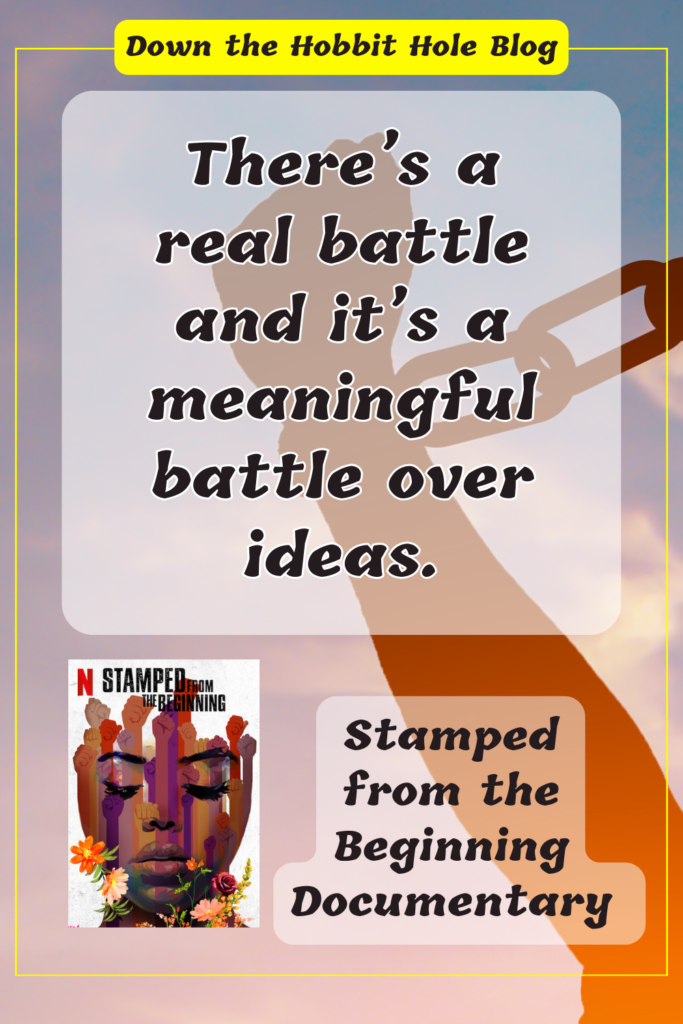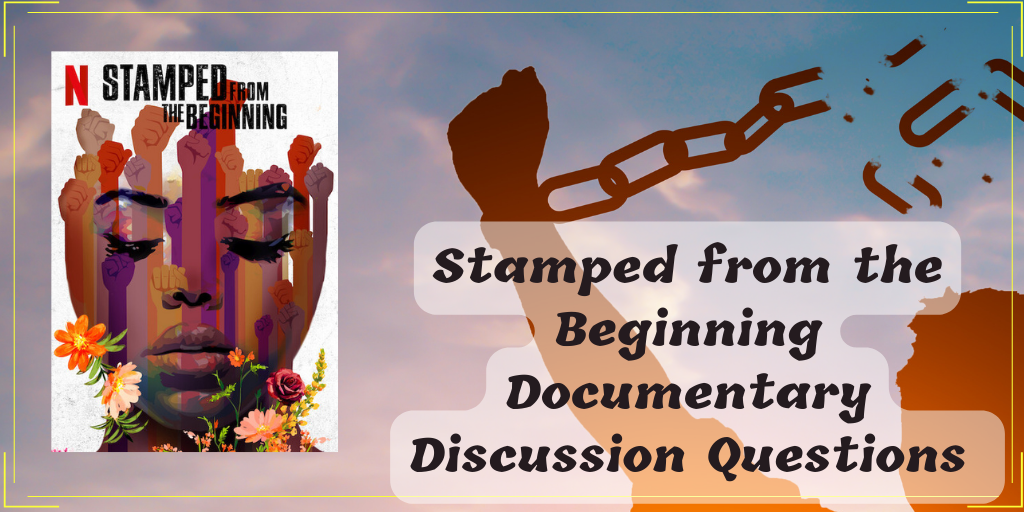Stamped from the Beginning Documentary by the Ent. This post contains affiliate links, you can find out more on our policies page or in the disclaimer at the bottom of the blog.
Know Before You Watch
Movie: Stamped from the Beginning
Rating: R
Genre: Documentary, Historical
Length: 1 hr. 31 mins.
Age suggested : 14 and up (with Parental Guidance)
Release Date: September 9th, 2023
Warnings: Some violent content, drug content, language, and nudity – all in the context of racism and slavery
Stamped from the Beginning Documentary Summary
Based on Ibram X. Kendi’s book, Stamped from the Beginning, this documentary follows the history of racism from it’s origins to today. It is led by many black voices, including Ibram X. Kendi, who speak into their specialties in order to tell and show the true history of Black America. It goes back in forth between specific stories to more general movements throughout the history.
Related Content: Stamped: Remix Discussion Questions
Continue for our Stamped from the Beginning Documentary Quotes

Impactful Stamped from the Beginning Quotes
We need to look at our history with a sober perspective.
There’s a real battle and it’s a meaningful battle over ideas.
When we look at race, we have to look at the fact that race has not always been a given.
An assimilationist still adheres to the idea that a racialized group needs to change.
Every black woman has a Phillis Wheatley moment.
What’s at stake is the entire colonial economy. It needs Black labor. It does not need or want Black art.
That’s the paradox that sits right at the core of America. You say freedom, but you’re an enslaver.
One of the most powerful myths about Black women that came out of the slavery era, was the icon of the Black Jezebel.
The notion of the white savior is really a counterpart to white supremacy.
I think it’s important to show that Black people freed themselves.
If your goal to help under-serviced, impoverished, Black communities come from your own personal research and there’s not a Black voice anywhere around you, you need to check your inventory.
By connecting that idea of protecting the women in your community, to this alleged threat of Blackness, you transform racist violence into virtue.
The very frequent inquiry made after my lectures by interested friends is “What can I do to help the cause?” The answer always is “Tell the world the facts”.
Police violence is modern day lynching.
I think that white people are afraid of what will happen if they put a mirror up to themselves, they’ll be able to see that for generations, for centuries, they have tormented and repressed black, brown, and tan people. They might not know what to do with that history.
The heartbeat of being racist is denial.
People are constantly thinking about, if we create an anti-racist society, what are they going to lose as opposed to what they’re going to gain.
The only thing wrong about Black people is that we think there is something wrong about black people.
-Stamped from the Beginning Documentary Quotes
Related Content: Beginning Your Anti-Racist Journey
Stamped from the Beginning Discussion Questions by Section
Themes to Discuss: Racism, Slavery, Oppression
The Stamped from the Beginning Documentary is broken into a few different sections. We have taken each section and created some discussion questions around each section in order to dive into each topic more deeply with others. PLEASE NOTE: I am writing these questions mostly for a white audience. I hope anyone can benefit from them, but I think I can write best by helping white people inspect their own thoughts on race, including myself.
The Invention of Blackness
- Why did ‘Blackness’ get created in the first place? How does this origin affect the identity of the Black community today?
- How did Zurara justify his racist doctrine? For what purpose was this done?
- Gomes Eanes de Zurara’s text begins to naturalize the racist doctrine. How are the ripple effects of that seen today? In what ways do you still see this actively occurring in today’s culture?
The Invention of Whiteness
- Similarly, why did ‘Whiteness’ get created in the first place? What were the differences and similarities in the reasoning for it’s creation?
- How did the invention of Whiteness create a difference for indentured and chattel slavery?
- This documentary shows the white elite and how many in society are trained to blame their problems on those who don’t look like them. How do you see this in your everyday life and what are ways to push back against the ideology as well as the elite itself?
The Myth of Assimilation
- If you are a white person, have you ever heard of code switching? Did this surprise you?
- Have you noticed advertisements showing the superiority of whiteness? If not, keep an eye out for it. It is not uncommon even today.
- How did Phillis Wheatley’s poetry help fight the myth of assimilation? How did it feel to you hearing that every modern Black woman has a “Phillis Wheatley moment”?
The Myth of Black Hypersexuality
- How was the myth of Black hypersexuality used as an excuse for white men to do whatever they wanted? What similarities to other previously discussed myths does this myth have?
- How do you see this myth being perpetrated in today’s culture? How can we advocate for Black women and girls against this myth?
- Harriet Jacobs, like Phyllis Wheatley, tells her story and begins the process of changing minds. For today, whose voices are listening to and whose stories are you hearing?
The Myth of the White Savior
- When you think of abolitionists, do you tend to think of white people, black people, both? What is a gap in your knowledge of abolitionism that could be filled a bit more?
- What are some examples in modern movies of the White Savior Complex that you can think of?
- Have you ever found yourself with White Savior thoughts? What do you do to try to assuage these thoughts?
The Myth of the Black Criminal
- The myth of the Black criminal has been engrained deeply in American culture.
- How do you see it most in today’s culture?
- Why are Black and White criminals viewed in such different lights, despite performing similar crimes?
- What are the best ways to push back against this myth?
- How was this myth just a modernization of the myths from the past?
The Truth of an Antiracist Society
- What is the difference between “not racist” and “antiracist”?
- Spend a few minutes discussing what an actual antiracist society would look like.
-What are the similarities and differences to current society?
-What are ways that we can push towards this new society?
Thanks for reading our Stamped from the Beginning Documentary Quotes and Review
Down The Hobbit Hole Blog and these Stamped from the Beginning Documentary use affiliate links. We only link products we think you’ll like and you are never charged extra for them. As Amazon Associates, we earn from qualifying purchases at no additional cost to you. All images used in this post were either original designs from Canva or used from media kits We also use cookies to gather analytics and present advertisements. Find our other reviews with discussion questions here. And our posts about family stuff here.
